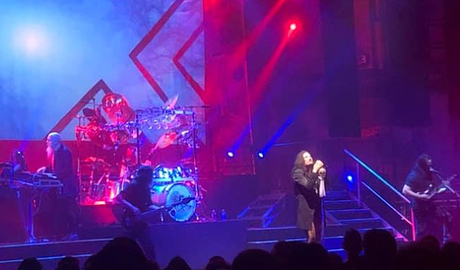by Paul J. Pelkonen

Dream Theater: (l.-r. Jordan Rudess, Mike Mangini (on drums) John Myung,
James LaBrie, John Petrucci) returned to the Beacon Theater on Friday night. Photo by the author.
The progressive rock band Dream Theater has enjoyed its long existence by following two rules: doing what they want to do as musicians and ignoring sniffing rock critics. (Critics have responded to this indifference by pretty much ignoring the band: their reputation rests on word of mouth.) Since I'm a classical music critic, I went to see them (for the sixteenth time since 1993) at the Beacon Theater on a night when the band was celebrating its return to its hometown of New York and I was celebrating my forty-sixth spin around the sun.
In recent years, the band (singer James LaBrie, guitarist John Petrucci, bassist John Myung, keyboardist Jordan Rudess and the new boy, drummer Mike Mangini) have been looking back at their catalogue, doing "anniversary" tours that cater to their fans by playing classic albums from the '90s in their entirety. This tour supporting DT's fourteenth disc Distance Over Time, also commemorated the 20th anniversary of Metropolis 2: Scenes from a Memory, their first concept album and one of the strongest efforts in the band's history.
However, new music first. Their first set had just six songs, but since this is Dream Theater, two of those clocked in at a quarter-hour each. The quintet played electronica into the house before they hit their redesigned stage set with "Untethered Angel", the first single from the new record. The show was played in front of a movie screen that helpfully showed the song titles as they came up in the set. (This seems to be a trend: Judas Priest did something similar on their current tour.)
The new stage set seemed to do much to help the band's overall chemistry as they charged into the deep thicket of "A Nightmare to Remember." Wireless tech enabled John Petrucci to move around onstage more, and the addition of catwalks, stairs and platforms on either side of Mike Mangini's drums meant that the four musicians could form a circle and play to each other. Also on a few songs, Jordan Rudess busted out his new Roland keytar, coming down to the lip of the stage to noodle right in front of the fans.
Those fans were on their feet for most of the show, in a sold-out Beacon Theater. This has always been a great venue to see this band, its old-school vibe and elaborate faux-Spanish baroque decorations matching the airy filigrees and ornamentation found in this music. The band thundered through "Falling Into the Light" and "Barstool Warrior" before the real highlight of the first set, a ripping version of "In the Presence of Enemies Part One" from the Systematic Chaos record. The set ended with another new track, "Pale Blue Dot" with some nice CGI graphics of satellites and the International Space Station--all branded with the Dream Theater logo.
The second set was the Metropolis album in its entirety: an elaborate rock opera in which James LaBrie plays five different roles. The plot is sort of like the Kenneth Branagh movie Dead Again: a hypnosis patient connects with the spirit of a woman murdered in 1928 and solves the mystery of how she was killed and who done it. The songs alternate between narrating characters, including two chilling ones from the point of view of the actual murderer. There are head banging rockers, uplifting anthems and sad, contemplative acoustic tracks. One of these, "Through Her Eyes" was accompanied with a heart-rending graveyard montage, featuring the headstones of Freddie Mercury, David Bowie, Chris Squire and Keith Emerson.
Mr. LaBrie sang his guts out on these songs, accompanied by the thundering, stuttering roar of the band. The highlight and climax of the entire show was the 13-minute track "Home," which combines a winding raag scale over a pounding, jackhammer rhythm to create that rarity: a progressive rock epic you can dance to. "The Dance of Eternity" followed, with the four musicians doing musical stunts. This is the aural equivalent of a quartet juggling chainsaws and just as error-free. The show ended with "Finally Free", another epic track built around a Dies irae that indicates that not all ends well for the album's protagonist. But what do you expect from an opera? A happy ending?
If you enjoyed this article, it's time to click over to Superconductor's Patreon page, and help support the cost of independent music journalism in New York City at the low cost of just $5/month.

